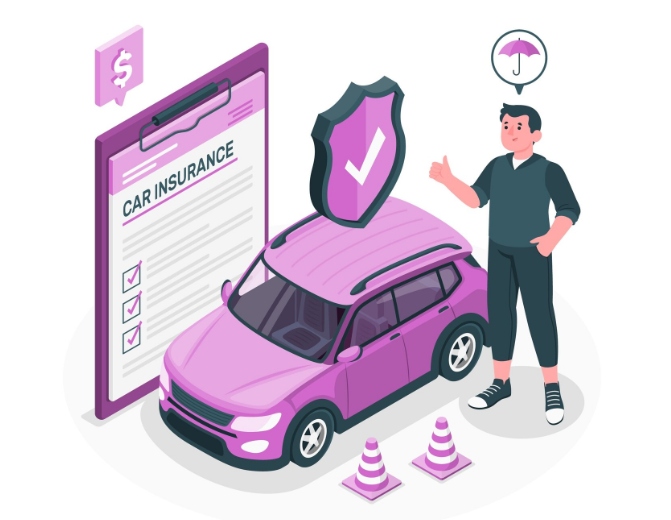Buying a car insurance policy is only the first step; understanding what it truly covers is essential for complete protection. A comprehensive car insurance policy offers peace of mind by covering a wide range of risks; however, it’s essential to review its features carefully.
Checking details like coverage limits, exclusions, and add-ons helps you avoid unpleasant surprises during a claim and ensures your policy provides the protection you need.
9 Key Things That Your Car Insurance Policy Should Cover
Not all policies are created equal. Before you hit the road, make sure your car insurance ticks these nine critical boxes:
1. Coverage for Own Damage and Third‑Party Liabilities
The foundation of any good car insurance is its coverage for both own-damage and third-party liabilities. While third-party insurance is mandatory, it only covers damages or injuries caused to others. To protect your own vehicle against collisions, fire, theft, or natural disasters, you’ll need a comprehensive car insurance policy.
2. Understanding Policy Limits and Sub‑limits
Insurance policies often include sub-limits for specific coverages. For example, there may be a cap on personal accident payouts, emergency towing, or key replacement. Knowing these limits helps you plan for out-of-pocket expenses in case of an incident.
3. Comprehensive Car Insurance Add-On Options
Standard policies don’t cover everything. Useful add-ons to consider include:
- Zero depreciation cover for full reimbursement of replaced parts
- Engine protection for damage due to oil leaks or flooding
- Consumables cover for smaller components like lubricants and nuts
- Roadside assistance for breakdown support
These add-ons strengthen your comprehensive car insurance policy, making it stronger.
4. Check the Claim Settlement Ratio and Settlement Trend
An insurer’s claim settlement ratio (CSR) reflects its reliability. A higher CSR means faster and more consistent claim approvals, which can make a big difference during emergencies.
5. Cashless Repair Network Availability
Cashless repairs save time and effort by allowing direct billing between the insurer and garages. Check if your insurer has a strong network of authorised garages in your area to make repair work hassle-free.
6. Customer Service and Digital Support Features
Reliable customer service can make all the difference when dealing with an unexpected situation on the road. A good car insurance provider should offer 24×7 assistance to help you navigate emergencies without delay.
Features like app-based claim tracking, instant policy downloads, and proactive updates ensure that you are always informed about your claim status. Insurers with robust digital platforms allow you to file claims, upload documents, and even track garage repairs from your smartphone.
Choosing a provider with strong customer support and advanced digital tools makes the entire insurance process faster, simpler, and stress-free.
7. Geographical and Usage Coverage
If you frequently drive across states or regions, check if your car insurance offers broad geographical coverage. Also, verify whether the policy covers private, commercial, or mixed usage to avoid claim disputes later.
8. Policy Exclusions and Claims Conditions
Every policy has exclusions. Common ones include:
- Driving without a valid licence or under the influence
- Damage from wear-and-tear or mechanical failures
- Losses during unauthorised racing or off-road use
Being aware of these exclusions can prevent rejected claims.
9. No Claim Bonus and Voluntary Excess Provisions
Look for policies offering a No Claim Bonus (NCB) to reward safe driving with lower premiums. Also, understand how voluntary excess works, it reduces premiums but increases your share in repair costs during claims.
5 Tips to Get the Most Out of Your Car Insurance Policy
Making the most of your car insurance isn’t just about buying a policy, it’s about smart management and regular upkeep. Here’s how you can maximise the value of your coverage:
1. Compare Quotes Carefully
Don’t focus only on the premium amount. Compare insurers on key aspects like the Insured Declared Value (IDV), available add-ons, claim settlement ratio (CSR), and the strength of their cashless garage network. Choosing wisely can save you from hidden costs during claims.
2. Review Your Policy Annually
Your car’s value depreciates over time, which changes your IDV and may affect your coverage needs. Review your policy every renewal cycle to ensure you have the right level of protection and to decide if you need to add or drop certain features.
3. Notify Your Insurer Promptly
In case of an accident or damage, inform your insurer as soon as possible. Most policies require intimation within 24-48 hours of the incident. Delayed notifications can lead to claim rejections or unnecessary complications.
4. Use Cashless Garages
Whenever possible, get repairs done at authorised cashless garages. It simplifies the process as the insurer settles bills directly with the garage, saving you the hassle of paying upfront and later seeking reimbursement.
5. Keep Accurate Documentation
Maintain both hard copies and digital versions of essential documents like your RC, driving licence, policy papers, and No Claim Bonus (NCB) records. Having these ready speeds up claims and helps during policy renewals or insurer switches.
A good car insurance policy should offer complete protection in every critical situation and not leave you second-guessing during claims. Regularly reviewing your coverage, updating it with essential add-ons, and making informed choices can help you avoid unnecessary stress.
A comprehensive car insurance policy, combined with the right planning, ensures your car and finances remain secure no matter what challenges you face on the road.


